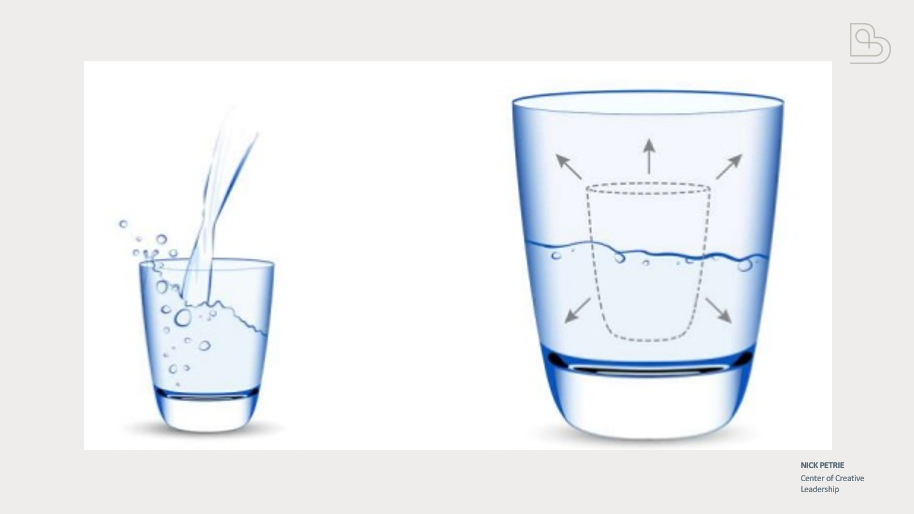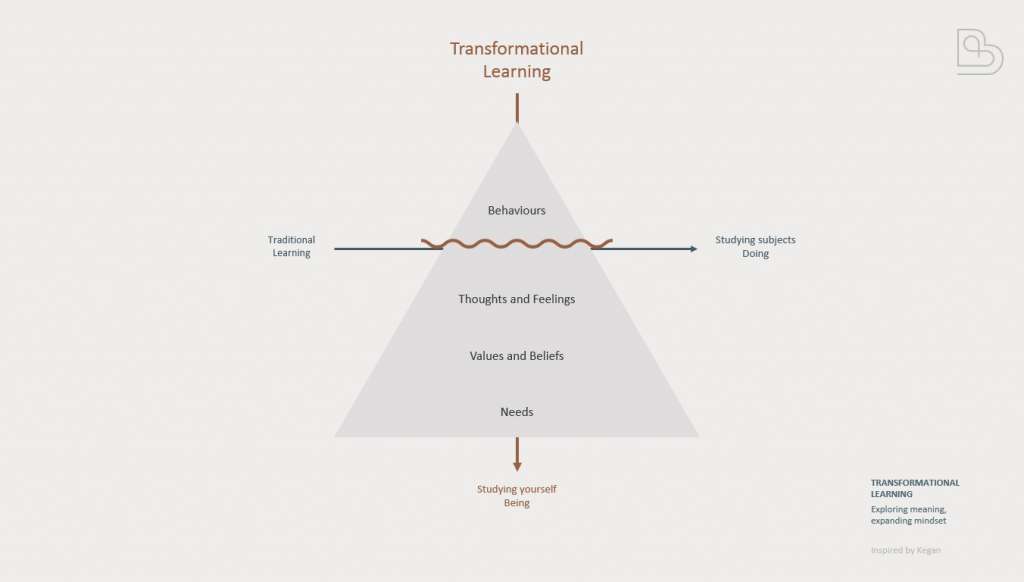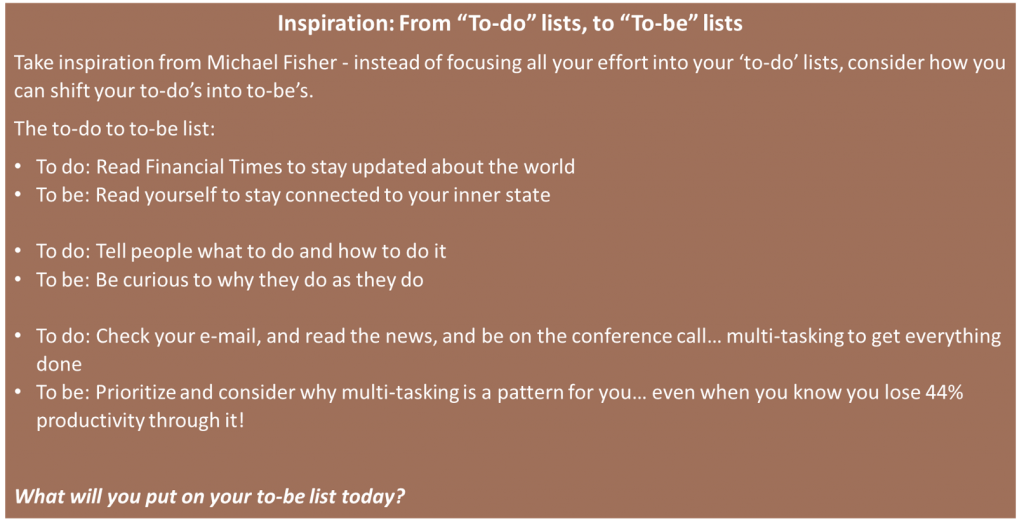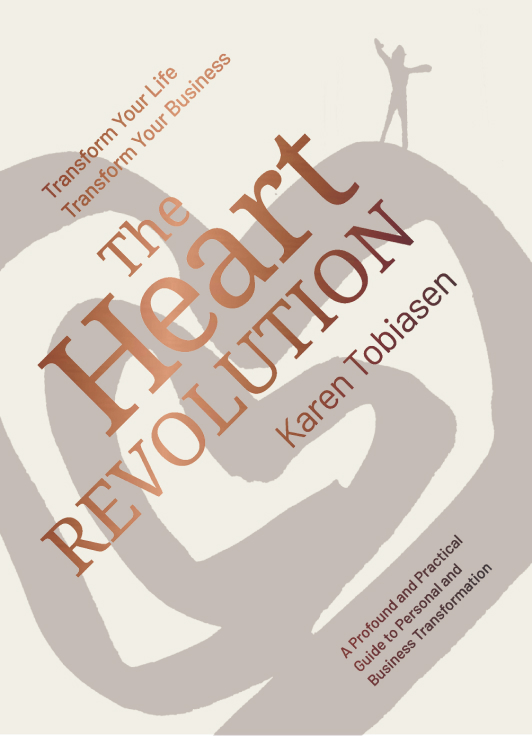“Self-awareness gives you the capacity to learn from your mistakes as well as your successes. It enables you to keep growing.”
— Lawrence Bossidy, Former CEO of Honeywell and Author of New York Times Bestseller ‘Execution: The Discipline of Getting Things Done’

Meet Bob.
Bob is a fictional leader who might sound familiar to you. He may remind you of someone, or maybe even yourself.
Bob’s been with the company for over 10 years. He’s been through days and days of leadership training, learning feedback models, SMART goal-setting, sales strategies, operational excellence and cost cutting. He knows what to do as a leader.
But Bob is working harder and harder to keep up. He’s exhausted, overworked, and often distracted. He comes across as distant to his team, often on his phone during conversations, quick to dismiss new ideas, and isolates himself from peers.
Bob’s real challenge is how to be. Yet Bob only thinks about what to do next, not what to be next.
Now imagine Bob slows down for a moment. He explores the underlying drivers of his behavior and listens to his thoughts, hearing things like “There aren’t enough hours in a day, I need to multitask to get it all done!”, “I’m the only one who knows how to do this, other people just slow me down.”, and “Why is it always me?!”
But when slowed down, Bob may be curious to see if these thoughts are really true.

Behind the thought and (limiting) belief “I need to multitask to get it all done!” Bob finds a fear of not being recognized or accepted in the team if he doesn’t deliver lots, at speed. And when he’s really honest with himself, he’s also afraid whether he’ll be able to keep his job. So, Bob asks himself – “Is it true I’ll lose my job if I don’t deliver?” – perhaps…
But then he asks, “Is it true I’ll lose my job if I don’t deliver everything by myself?” This sparks a different answer. It shows there is another way to deliver at speed, and it’s not by doing it all alone. And by inviting others in to collaborate Bob can connect more with peers and team members, fostering a community that sends positive ripples to dislodge other limiting beliefs, such as others slowing him down.
By slowing down and exploring himself, Bob learns a more empowering belief: “I can deliver with speed by collaborating with others.” Letting go of his limiting belief enables him to show up and “be” a more present, collaborative, and impactful leader and colleague.
What beliefs are holding you back?
From focusing on “doing” to “being”
We’ve been raised to focus on studying traditional subjects – like math, marketing or management – and celebrating IQ. Development is often defined by how skillful we are in doing what we already know – just better, smarter, faster.
But as was the case with Bob, this isn’t enough. We may believe we need to do more to create value, but often it’s also about how we show up. By being conscious about what we bring into our actions and interactions every day, we can create more value while doing less.
Michael Fisher of Cincinnati’s Children Medical Hospital Center explains how he chose to create a “to-be” list for himself, and credits it for his performance as a leader getting the hospital through challenging COVID-19 times:
“I never purposefully gave thought to whether there’s a way to be really intentional about how I want to show up every day. So I’ve added a ‘to be’ list to my repertoire. Today, for example, I want to be generous and genuine. I hope I’m that way every day. But today, I want to make sure it stays top of mind. On a different day this week—and look, you can see it here in my calendar—I knew that part of my job was to be collaborative and catalytic. So I pick out two qualities, two kinds of ‘to be,’ every morning as part of my normal routine.”
The global pandemic was stressful for all leaders – especially those in the medical field. It would’ve been impossible for Michael Fisher to wake up and plan his tasks by trying to predict what he would need to do. But he could know how he needed to be. That to deliver on his responsibilities to patients, employees, and society – he needed to be collaborative, and catalyze solution and decision-making in a time-critical context.
A rapidly changing world is bringing complex challenges we’ve never faced, and uncertainty as to what’ll be needed and relevant in the future. With Dell Technologies (among others) finding that 85 per cent of the jobs that’ll exist in 2030 haven’t even been invented yet, we’re probably better off planning for how we want ‘to-be’, rather than try predicting what we are ‘to-do’.
While upskilling is still relevant, it’s no longer enough for solving our new complex and non-linear challenges. Adding knowledge at the same level doesn’t make us ready for the future, and it doesn’t enable us to be the best versions of ourselves in the current either.
Adding Transformational Learning to your learning path

Facing our only increasingly complex challenges requires us to learn – un-learning and re-learning – what’s relevant for us and our organization at a given time. The process of building the capacity to do so is Transformational Learning.
Transformational Learning is studying ourselves to solve complex challenges by shifting our mindset. We re-learn how to learn, expanding our learning agility and capacity by building an in-depth understanding of ourselves and others.
For Bob, the biggest blocker was actually himself. The same goes for organizations – at the root of most unsolvable challenges and transformations that fade or fail, in an internal blocker – it’s the collective mindset, the culture, holding them back.
By slowing down to explore the thoughts, beliefs and needs that shape how we make sense of the world – we can systematically work to strengthen the ones that accelerate us, and shift the ones that hold us back. We can explore beyond cognitive intelligence – also leveraging physical, emotional, and spiritual intelligence – allowing us to recognize patterns, solutions, systems, and interdependencies that went unnoticed before Developing, updating, or changing our mindset and inner operating model.
Transformational Learning is not about what we know. It’s about how we think, how we make sense of the world around us. As Barrett C. Brown, Ph.D. writes in The Future of Leadership for Conscious Capitalism (2014):
“…[it] not only upgrades a leader’s operating system, it rewires their hardware and expands their leadership competency and capacity. It literally alters brain functioning and recreates a leader’s worldview.”
Many of us hold the limiting belief that working hard – doing ‘stuff’ is the recipe for success in a fast-paced world. We have a hard time understanding that our inner being would accelerate progress – moving us to a place where working smarter not harder isn’t an overused cliché, but a proven recipe for the future.
Transformational Learning is how you upgrade your operating system – boosting your capacity to handle complexity and find opportunities in challenges.
Is your operating system ready for the future?



